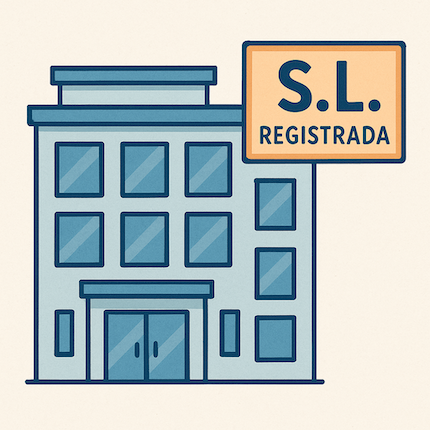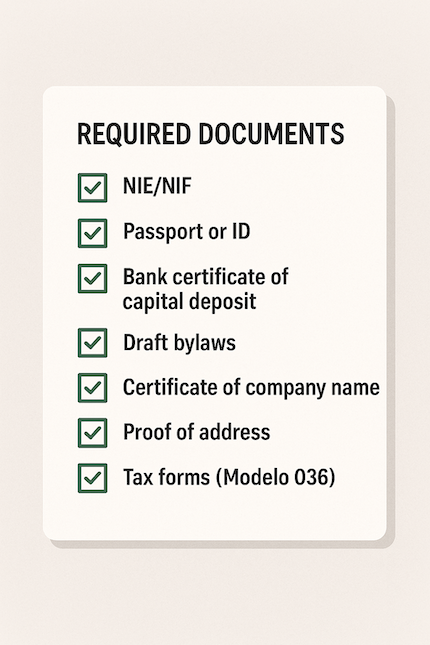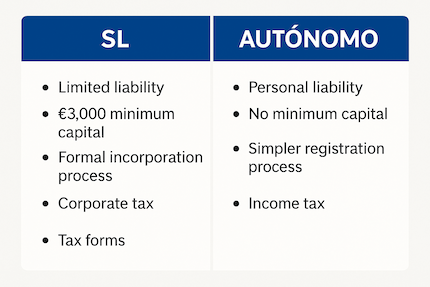If you're thinking about starting a business or managing a company in Spain, understanding Spanish…

Company registration in Spain: Start your business with confidence

If you’re planning to start a business in Spain, you need to register your company following a series of legal and tax steps. This guide, written by the team of business lawyers from Puentes de Muras Legal, walks you through the process in plain English so you can launch your company with clarity and peace of mind.
What is company registration and why it matters

Company registration in Spain is the official process of creating a legal business entity, such as a Sociedad Limitada (SL). Registering your company gives you legal recognition, tax identification, and the ability to operate commercially.
Can a foreigner register a company in Spain?
(Imagen sugerida: Mapa de Europa con foco en España y flechas desde otros paí
Yes, foreigners can register companies in Spain. You don’t need to be a resident, but you must obtain a NIE (foreigner ID number) and appoint a tax representative if you’re not residing in Spain.
Step-by-step process to register your company in Spain
1. Choose the right legal structure
Most foreign entrepreneurs choose a Sociedad Limitada (SL), which offers liability protection and is ideal for small to medium businesses. More on our article about legal structures for companies.
2. Get your NIE or NIF
The NIE is essential for any legal transaction in Spain. Apply through the Spanish consulate of your home country or local police station.
3. Reserve your company name
Request a certificate of uniqueness (“certificado negativo de denominación social”) from the Central Commercial Registry.
4. Open a business bank account
Deposit at least €3,000 as share capital. Your bank will provide proof for the notary.
5. Draft bylaws and sign before a notary
You must sign the public deed of incorporation and bylaws before a Spanish notary.
6. Obtain provisional NIF and register for taxes
Request a provisional company tax ID (NIF) from the Tax Agency and register under the correct tax regime.
7. Register in the Mercantile Registry
The notary sends the deed to the Registro Mercantil. Once registered, you receive the final NIF.
8. Register for Social Security and labor obligations
If you hire employees, register with Social Security and obtain a company labor number.
How long does it take to register a company in Spain?
Registering a company in Spain usually takes 2 to 6 weeks depending on the region and the efficiency of each step.
What documents do you need? (With a downloadable checklist)

- NIE/NIF
- Passport or ID
- Bank certificate of capital deposit
- Draft bylaws
- Certificate of company name
- Proof of address
- Tax forms (Modelo 036)
How much does it cost to start a company in Spain?
On average, the setup cost ranges from €1,500 to €3,000, including notary fees, registration, legal advice, and capital. (Source: ICEX España Exportación e Inversiones)
Common mistakes to avoid when registering your company
- Not getting NIE in time
- Choosing the wrong company type
- Skipping the bank deposit
- Not understanding tax obligations
Example: How John opened his tech company in Valencia
Picture John, a U.S. software engineer, opened an SL in Valencia with the help of a business lawyer in Spain. He got his NIE remotely, set up a digital business bank account, and had his company registered in 18 days.
Legal benefits of setting up an SL instead of being autonomo

An SL limits your liability, helps you build business credit, and is better for growth. Autónomos model (self-employment) is simpler but riskier for businesses, as the business liability is individual and not corporate.
Do you need a business visa to start a company in Spain?
Yes, if you are from outside the EU. Spain offers an entrepreneur visa and a self-employment visa under the Ley de Emprendedores.
What comes after registration? Tax and accounting obligations
You must:
- File VAT returns (IVA)
- Pay corporate tax (25%)
- Maintain bookkeeping
- Submit annual accounts to the registry
FAQs about company registration in Spain
Can I open a business in Spain if I’m not a resident? Yes, but you’ll need a tax representative.
What type of company is best for me? Most foreigners choose an SL due to liability protection.
How much capital do I need? At least €3,000 for an SL.
Do I need to travel to Spain to register? Not necessarily. Some steps can be completed remotely with a power of attorney.
Can I register a company online? Only partially. Some portals exist, but a notary is still required.
What taxes will my company pay? Corporate tax (25%), VAT (21%), and local business taxes.
Conclusion: Start your company in Spain with confidence and legal support
Registering a company in Spain is totally feasible if you follow the right steps and avoid common pitfalls. At Puentes de Muras Legal, we specialize in helping international entrepreneurs like you navigate the legal process with ease.

Antonio José Puentes Alonso is a lawyer specialized in corporate and energy law, with over 20 years of experience. He has led legal departments in multinational companies, handled arbitration and insolvency cases, and holds advanced training in tax law. He provides comprehensive legal advice on transactions, risk management, and business planning.


